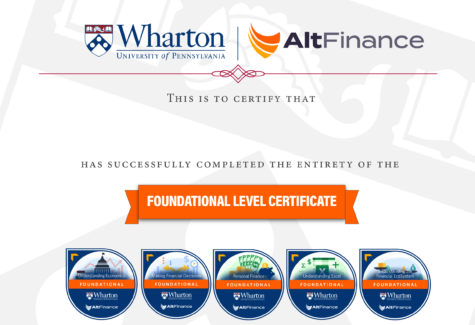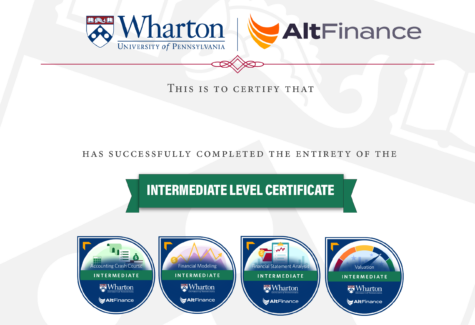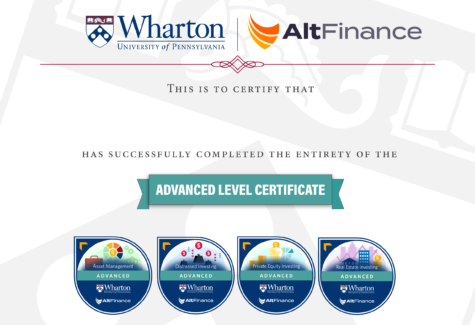
Courses
Students can earn digital badges in 13 courses offered by the Wharton-AltFinance Institute. Each course is designed by a Wharton faculty member and is meant to challenge students to ensure their mastery in each topic. Upon successful completion of a course, students earn a digital badge that they are able to share on their social media profiles to demonstrate their mastery of the content area. After completing all courses within a certain level, students will also be awarded a certificate. These self-paced online programs create space for students to learn the foundational skills and tools needed to navigate the field of finance and alternative investments.

Foundational Courses
Making Financial Descisions
This course provides an introduction to financial analysis and making financial decisions. Financial analysis provides a structure to estimate and compare the costs and benefits of decisions made in our personal lives and within an organization, such as a firm. Students taking this course will develop a foundational understanding of rational decision-making using financial analysis tools and the ability to apply that framework to make personal investing decisions, allocate capital within an organization or firm, and determine the value of a firm, project or any asset that produces cash flow. Students will also learn how to assess risk. Moreover, they will understand the relationship between risk and return when investing and gain a general understanding of financial markets.
Personal Finance
This course provides an introduction to personal finance, as it pertains to concepts like inflation, interest, banking, loan, retirement and taxes. Our goal is to help students learn how to leverage their concept learnings effectively for industry success.
Understanding Economics
this course aims to provide a timely framework to understand economic recessions and expansions and the financial markets’ and governments’ response to world events. Economic arguments shape international events, government policies and business strategies. Some of the questions we will be answering are: How do markets work? What does economic contraction look like? How are contractions/recessions connected to employment? How does the Central Bank operate, and what is the Federal Reserve currently doing? What is the debt ceiling? We will introduce the policy options of government spending.
Understanding Excel
This course provides an introduction to Microsoft Excel software through clear guidance on key features, shortcuts, and ways to leverage the platform for all of your data needs. It starts with an overview of the basic and advanced functionality of Excel understanding, before diving into data analysis, using financial examples to illustrate best practices along the way. Our goal is to help students learn how to utilize Excel efficiently and effectively for datasets, projections, or calculations.
Understanding the Financial Ecosystem
This course provides a high-level view of the finance industry and what finance professionals do, providing an overview of fundamental vocabulary and insights that every finance professional needs to know. Our goal is to help students learn how to leverage their concept learnings effectively for industry success.

Intermediate Courses
Accounting Crash Course
This course provides an introduction to accounting as it pertains to alternative investing. It starts with a deep understanding of the basics of accounting, how to read financial statements, and more complex ideas like how the four types of adjusting entries required by accrual basis accounting might affect a company’s reported financial results. Our goal is to help students learn how to leverage their concept learnings effectively for industry success.
Financial Modeling
This course introduces the financial model which represents a firm’s performance, resources, financing decisions, and risks to help us understand the firm better and make better decisions about the firm. The key focus of this course is to understand how financial models are used by financial analysts to analyze past performance and forecast future performance in order to estimate the value of the enterprise and place a value on a firm’s stock price. Knowledge about the firm, the industry, and the economy will be vital for successful financial modeling.
Financial Statement Analysis
This course introduces the financial model which represents a firm’s performance, resources, financing decisions, and risks to help us understand the firm better and make better decisions about the firm. The key focus of this course is to understand how financial models are used by financial analysts to analyze past performance and forecast future performance in order to estimate the value of the enterprise and place a value on a firm’s stock price. Knowledge about the firm, the industry, and the economy will be vital for successful financial modeling.
Valuation
This course provides an introduction to concepts, principles, and practices of how we estimate the value of something, such as a company, individual assets, projects, or new investments. This course is broken down into modules to help students understand the different conceptual blocks of valuation with subjects like forecasting, discount value, and market multiples.

Advanced Courses
Asset Management
This course provides an introduction to asset management, highlighting the discipline part of finance and investing that focuses on the body of principles/knowledge on which most investors, and nearly all finance professionals, rely. Our goal is to help students learn how to leverage their concept learnings effectively for industry success.
Distressed Investing
Private Equity Investing
This course provides an introduction to private equity, leading you through some of the main concepts in Private Equity and the lessons learned from professionals in the industry. Our goal is to help students learn how to leverage their concept learnings effectively for industry success.
Real Estate Investing
This course provides an introduction to Real Estate Investing. Students taking this course will learn about the different types of real estate markets and be able to conduct property-level investment analysis by the end of the course. Some other topics discussed in this course are alternative financing structures, cash flow modeling, and REITs.
All of our courses are free and completed virtually. To access our courses, please visit the AltFinance website and sign up for the AltFinance Institute.
Contact Us
To learn more about our work, course offerings, or program logistics, please contact us.


